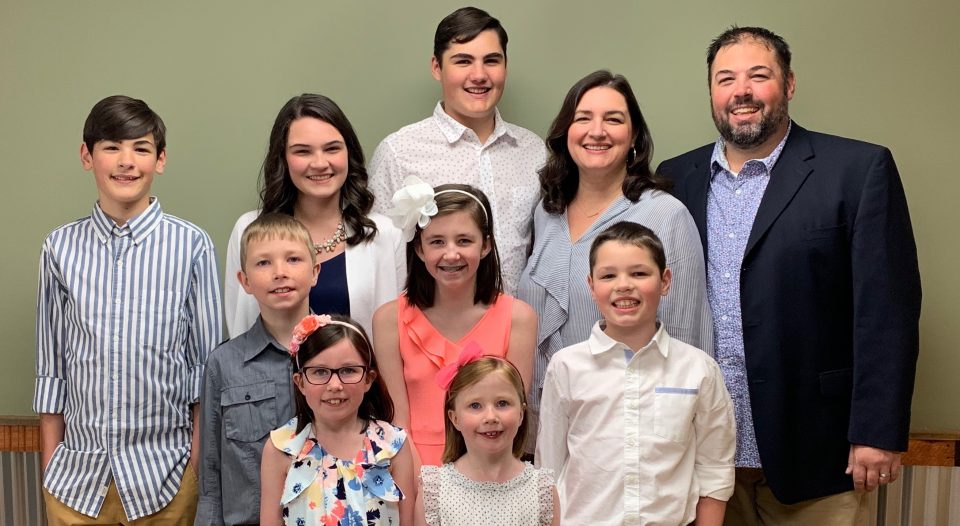It’s been a couple of months since my last past about Fear. We’ve endured the holiday season since then and taken a family vacation. Both are firsts for our full family.
 We’ve been having some challenges with our youngest. Behavioral, cause and effect, and bonding issues with mom, mostly. The bonding issue became so intense in early December we started to do some research. Of course, we’d watched the videos, attended the Empowered to Connect conference, and done research on bonding before. To be honest, we were looking at all those resources with the anticipation our nine year old would be the one who would struggle. We just never thought the four year old would be the one having a hard time. But as we began to read about these kinds of issues lots and lots of adoptive families have had, it really began to make sense why we were struggling with her.
We’ve been having some challenges with our youngest. Behavioral, cause and effect, and bonding issues with mom, mostly. The bonding issue became so intense in early December we started to do some research. Of course, we’d watched the videos, attended the Empowered to Connect conference, and done research on bonding before. To be honest, we were looking at all those resources with the anticipation our nine year old would be the one who would struggle. We just never thought the four year old would be the one having a hard time. But as we began to read about these kinds of issues lots and lots of adoptive families have had, it really began to make sense why we were struggling with her.
First, and as I’ve written previously, her biological age may be four years, but her emotional and sometimes behavior age is much younger. We think somewhere in the 24 – 30 month range. So she is at least 18 months behind where she would developmentally be. It’s a lot harder than it sounds for parents to expect two year old behavior from their four year old rather than age appropriate behavior. It’s difficult to remind yourself of her emotional age when something goes wrong and her reaction isn’t normal for her age. This has been extremely difficult and has given birth to great frustration and even some parenting mistakes (believe it or not, we are not perfect parents!). As we read and studied about this issue further, we began to see some of the evidence of this and how some of our methods weren’t productive. For instance, a two year old has very little cause and effect understanding. My dad loves to tell a story from my toddler years. He had a very nice stereo system and I loved to play with the knobs. One day he stood beside me and kept saying “no” while smacking my hand. Yet I continued to touch the knobs and turn them. I had not concept of cause and effect. I couldn’t make the connection between touching the knobs and getting my hand smacked. One of the issues we’ve had with our youngest is waking up her siblings very early in the morning. She’s been disciplined, sat in time out, had things taken away, had to sleep in a pack and play in our room, none of which changed behavior. Because she’s four, she can repeat to us the expected behavior, but she just can’t follow the instructions. This is maddening!!! Until we remind ourselves of her emotional/cognitive age.
Connected to that Amy and I had passed this stage with our bio kids. Our youngest bio child is five, but he acts much older because of his older siblings. He just processes the world at a level beyond his chronological age (ironic, isn’t it?). I know many people raise their children into late childhood/early adolescence and then have a little bundle of “SURPRISE” come along. You’re not ready for it. You don’t expect it. All your paradigms have just shifted. The life you thought you knew is no more and won’t be back for a dozen years. That’s how it’s felt for us. It sounds very trivial, but it’s been an enormous leap backwards. We were past the stage of little ones in the house. Now we have had to break out the sippy cups, bibs, pack and plays, and are feeding, wiping butts, etc once again – all because these precious little ones didn’t receive the proper care they needed at critical developmental stages. All I’m saying is we weren’t prepared for that. If you’re adopting in this way, you better get ready for this leap back to the future!
By far, though, the greatest challenge and pain has been around bonding. As we have read about trauma in young children, we are learning the issues our youngest no doubt is facing. We figure she had zero months or years of normal, optimal care given to her, zero normal bonding moments before being placed in foster care. Trauma existed from the moment and likely before she was born. So her “normal” is nothing like yours or your biological children’s “normal.” Per a study I just read last week you can find HERE, her brain likely has gaps and literal missing connections because of the trauma she has endured. I mean, as well cared for as she was in her foster homes, it still wasn’t a family. She still didn’t have a mommy and daddy. She still couldn’t understand what it means to fully belong and be complete. Add on top of that we are her FOURTH home…..yes, she is four and we are her fourth home, and no wonder she is struggling. I have no doubt these and many other questions have rolled in her head, even if she couldn’t articulate them this way:
Is this home like the others and I’ll eventually be leaving?
I wonder when another woman will come along and try to take care of me?
Am I safe? Can I trust these people with my whole heart/life?
What is a “mommy” and “daddy”?
Why do I have to do all the things they say?
Do I want to be here?
Why should I love these people? They’ll eventually leave me too.
I won’t open my heart. It hurts too much when I have to leave.
Permanence. The understanding she belongs forever with us and won’t have another family is a concept likely missing and never developed in her little brain. Honestly, I’m not sure it’s fully developed in the other kids either. I’m convinced this issue of permanence is what gives rise in children to trust issues, fear, and the like. Plus, even for kids who do understand and desire to be in a family, once they find out what it REALLY means to have parents, siblings, etc, they may want to change their mind! I always think about this when I see an older child up for adoption. I can’t imagine how different their expectations for being in a family will be from reality. The good news for us, with a four year old, is science has demonstrated she can likely develop and regain all or most of whatever is missing or was lost. We are learning, though, we must do the right things for this hope to become a reality.
The caution here is this…..doing the right thing for your child and your family won’t always sit right with others. We live very public lives as lead pastors of a church and our family is very much on display. Thankfully, our church has never made this an issue, though I know it’s not that way everywhere. However, some of the things we are discovering we need to do with our youngest two will seem odd, different, or even mean to some outsiders looking in. Pulling them out of classes, keeping them attached to my wife at the hip, having to decline gifts and candy and treats from well-meaning people, declining offers to babysit, not allowing physical contact or emotional connections with anyone but mom right now, and many other little things we are just now learning are critical to healing whatever is broken. These kinds of boundaries are hard for people, family particularly, to understand. We don’t expect it to be this way forever, but for a season, this is how we must live.
If you’re in that family/friend category to adoptive children, and not just mine, let me encourage you. If you’re confused by something the parents of an adoptive child in your life are doing, ask them about it. Kindly, un-accusatory (especially you grandmas and surrogate grandmas!!) and with care, ask the parents what would be OK or appropriate. Give the parents the opportunity to decide what’s best for their little one(s) rather than rushing in with the candy or gift or whatever you want to give the child. Recognize these children have not lived normal lives.
They aren’t like everybody  else…at least not yet….and possibly never for some. Be conscientious and respectful of what adoptive families must do to help their children bond and develop pieces of their life stunted by trauma. Address your thoughts, desires, and concerns with mom and dad and then trust their decisions. God has called them to that child, not you. You can likely walk with them but make sure what you intend for good isn’t actually setting them back.
else…at least not yet….and possibly never for some. Be conscientious and respectful of what adoptive families must do to help their children bond and develop pieces of their life stunted by trauma. Address your thoughts, desires, and concerns with mom and dad and then trust their decisions. God has called them to that child, not you. You can likely walk with them but make sure what you intend for good isn’t actually setting them back.
For those adoptive parents out there facing some of these same things or even things much more challenging that us….stay the course. Hold on to each other and to Jesus. Refuse to give up on the call of God for your life. Fight in the spiritual as much as you are in the natural. Some things only come that way. Don’t fight alone. Let someone walk with you – even besides your spouse. You need the companionship, support, and conversation of a good friend. They won’t understand everything you’re facing, but they don’t have to. The temptation is to isolate and walk alone since no one really understands. Don’t. You’ll lose yourself and your sanity!! Give yourself PERMISSION to go to coffee, take a break, not do the dishes or that last spelling assignment today. Spend time with God. Press into Him – not away from Him. His presence will sustain you, strengthen you, encourage you. God is with you so let Him show you how much!!…..and like Journey said….Don’t Stop Believin’!!

We are right there, right in it with you. I understand this all too well, right down to the unrealistic expectations and parenting mistakes made as you sift thru the trauma and behavior issues. So grateful to do this with others that are not afraid to bring the truth of it all into the Light. So grateful for a Savior who loved us when we were still His enemies and exemplified perfect love for us so that we could press on. He pours in, we pour out. All is grace.
LikeLike
Thank you for sharing! Although we don’t seem to have these struggles now, who’s to say things won’t surface in the future? I appreciate your thoughts and words of wisdom.f
LikeLike
Great insights, keep sharing your journey, you are helping a lot of people forge their own paths! You guys are doing a great job.
LikeLike